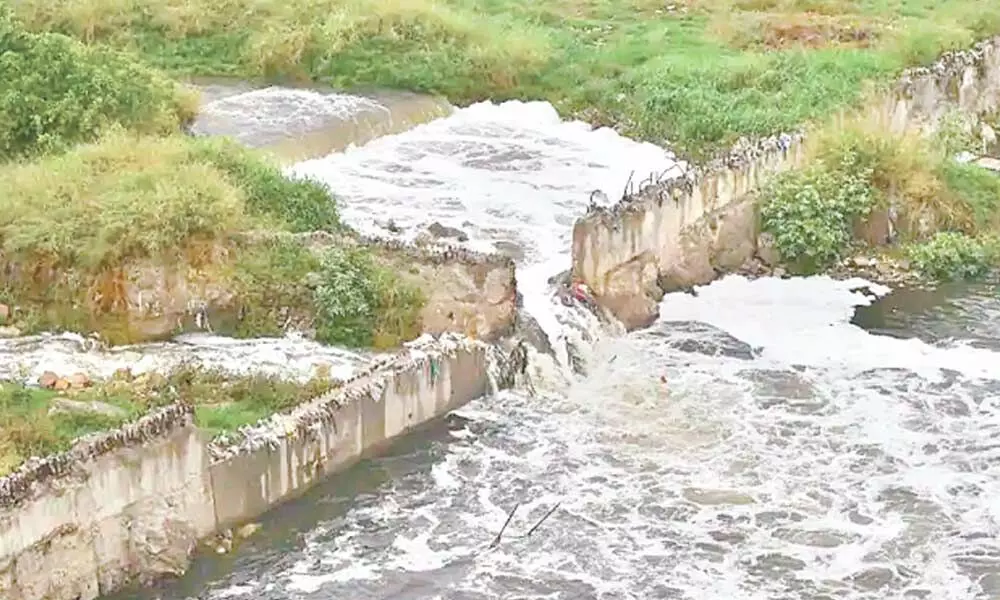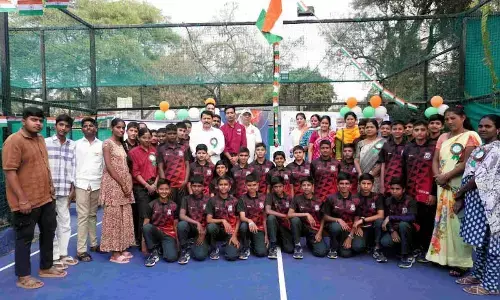Alerting Covid-19 spikes two weeks in advance

Alerting Covid-19 spikes two weeks in advance
IIT Gandhinagar conducts study on wastewater surveillance
Surveillance of untreated wastewater can warn officials about an impending spike or decrease in Covid-19 cases up to two weeks in advance, according to a study conducted by scientists at the Indian Institute of Technology (IIT), Gandhinagar. The researchers, including those from Gujarat Biotechnology Research Centre (GBRC), explored the association between the SARS-CoV-2 genetic load in wastewater and the number of COVID-19 cases at the district level in Gandhinagar, to establish if wastewater surveillance can be an effective tool to warn about the disease early.
"This is the first ever proof based on weekly surveillance in India that unravels this early warning capability of wastewater surveillance for Covid-19," Professor Manish Kumar from the Department of Earth Sciences, IIT-GN, who led the study, told PTI. "The results are very encouraging, and we are planning to share them with the authorities," said Kumar, adding that it is the need of the hour that officials should take up wastewater-based epidemiology (WBE) as a policy intervention for Covid-19 mitigation plan.
Professor Prosun Bhattacharya, from KTH Royal Institute of Technology, Sweden agreed that wastewater surveillance should be made a part of Covid management not only in India but even globally to have a stringent control of the prevalence of the SARS-CoV-2 infections. "This study led by IITGN team strongly suggests that WBE surveillance must be made a mandatory step in a national health surveillance programme, especially as an integrated part of Covid-19 pandemic monitoring," Bhattacharya told PTI. "This will help the water authorities to identify the hotspots in a city to provide up to 2 weeks of time lead for improvising smart and demand driven interventions for Covid-19 management," he added. Bhattacharya noted that wastewater surveillance from the domestic flights would also be a critical step to follow in order to track the mobility of the population who are the potential careers of SARS-CoV-2 for eventual disease spreading.
Kumar also claimed that WBE can help monitor the efficacy of vaccines against Covid-19 after they are rolled out. "Wastewater surveillance can be in place for monitoring the condition of wastewater coming out from key buildings like the Parliament or Secretariat or south block in Delhi to compare the situation in the pre and post anti-Covid-19 vaccine era," he explained. Conducted in collaboration with the Gujarat Pollution Control Board (GPCB), the study has been posted on the preprint repository medRxiv and is under review in the journal Environmental Research.
The research builds on a study conducted by the team in May last year in Ahmedabad, wherein the team demonstrated the first-ever successful detection in India of the genetic material of SARS-CoV-2 in wastewater. The latest study analysed SARS-CoV-2 RNA in the 43 samples from four wastewater treatment plants during August 7 to September 30 period, last year. Influent or untreated part of wastewater was collected from each plant, twice in a week at first, followed by weekly collection for two months.
A total of 43 influent wastewater samples were thus collected in the period from the four plants. Three target genes of SARS-CoV-2 were considered and presence of two or all genes in a specific sample was considered as 'positive' for Covid-19. The researchers said a total of 40 samples out of 43 were found to be positive i.e. having at least two genes of SARS-CoV-2. They then did a time-based comparison of official, documented cases of Covid-19 with the percentage change in genome concentration in the samples.
Professor Ryo Honda, associate professor at Kanazawa University, who is leading a task force on wastewater surveillance in Japan, said the study has important implications for WBE of COVID-19 in India. "In Japan we also explicitly found the WBE potential to predict the COVID-19 cases where SARS-CoV-2 was detected even when the number of reported cases was less than 1 per 100,000 people," Honda told PTI. "Wastewater surveillance for the athletes' village has been proposed as one of the key elements for COVID-19 risk management during the upcoming Tokyo Olympic 2021," Masaaki Kitajima, from Hokkaido University, added. Experts say WBE is a promising approach to understand the status of disease outbreak in a certain catchment by monitoring viral load in wastewater.
"We detected SARS-CoV-2 genes in the wastewater first and patients were then back-traced before the symptoms appeared," Aaron Bivins, from the University of Notre Dame, a key member to create Global Collaboration on WBE of COVID-19, said. The US federal government has worded a contract for monitoring of wastewater coming from one third of the US population," he said. Studies have reported that the novel coronavirus is present in the faeces of infected individuals.
Genetic material (RNA) from the virus has been found in sewage entering treatment plants. Because treatment plants collect wastewater across large regions, measuring the level of RNA in untreated wastewater may provide a valuable insight into the percentage of people infected within a region, the researchers said. Using RT-PCR tests, researchers can detect the novel coronavirus with high sensitivity, Kumar added.

















